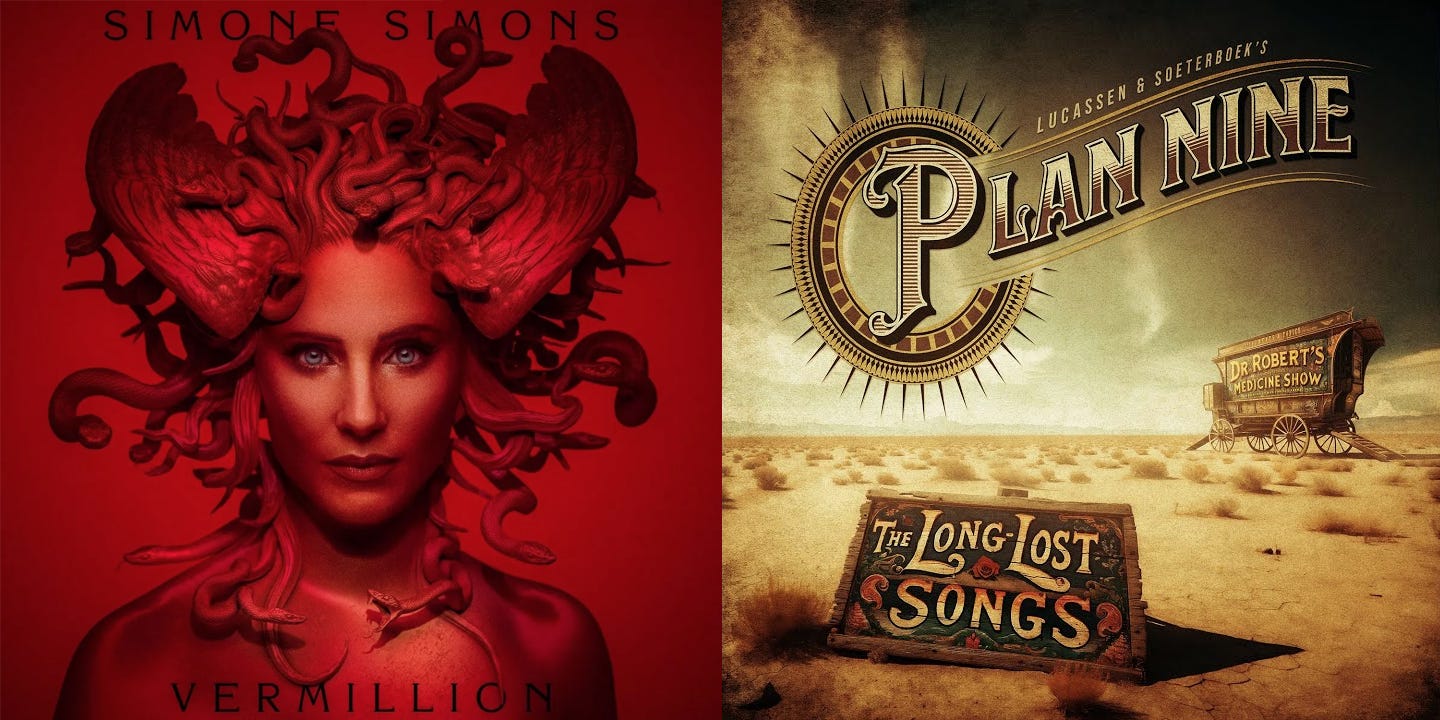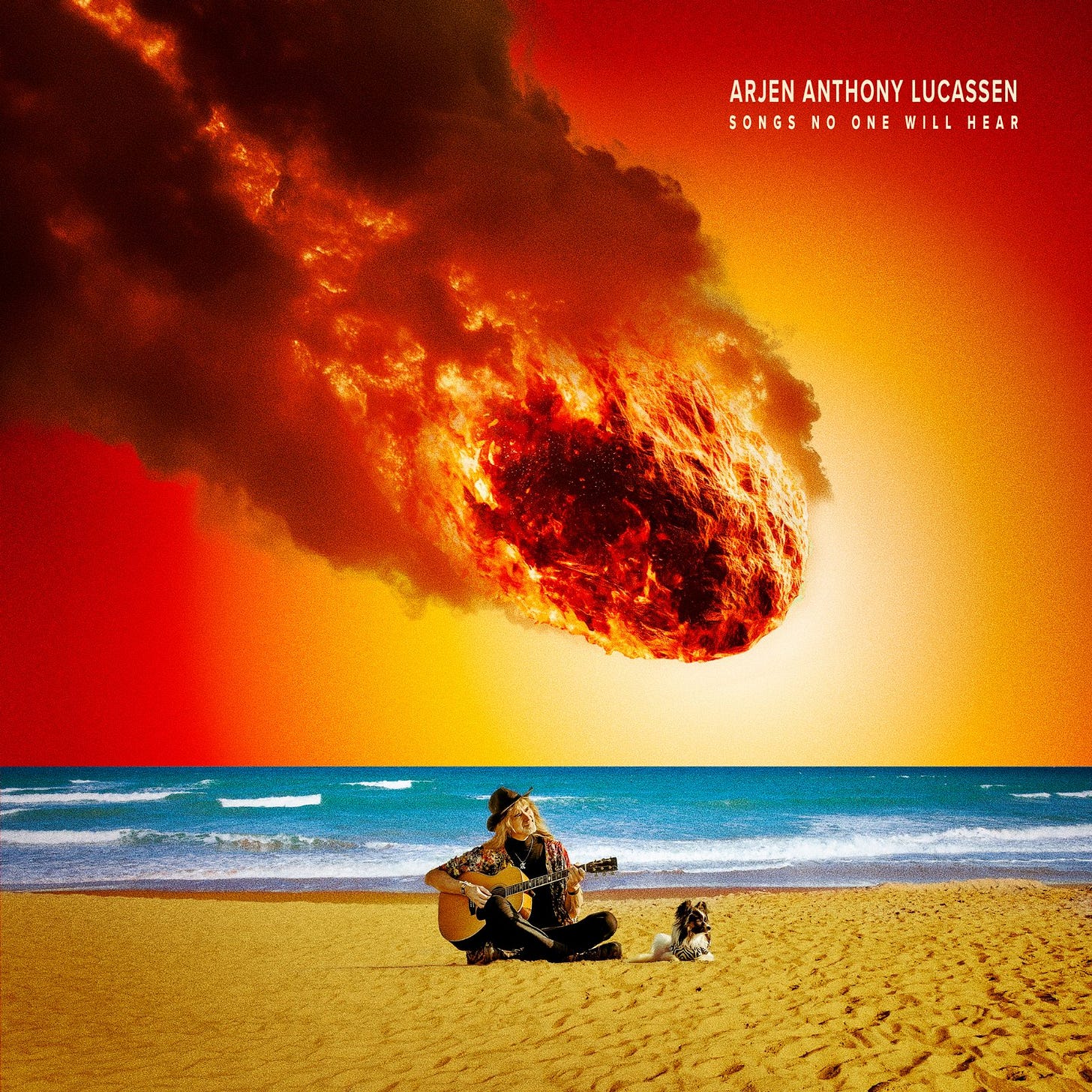“Music chose me when I was ten years old.”
If you prefer to watch this video on Youtube, you can watch it here
J: Before we talk about your new album, the first solo record that you've done in 13 years... I gotta say, this is the first time that I get to speak with a knight!
Back in April you were granted the title of Knight on the order of the Netherlands Lion, the second highest civilian decoration granted by the Kingdom of the Netherlands, usually given to people who have contributed significantly to the arts and sciences. So, obviously, first of all, congratulations for this recognition. It's fantastic to see that the country has recognized the enormous contributions that you've made to music and to the arts more broadly.
How did this happen? Did you know that it was going to happen?
Arjen: I knew nothing, to quote Manuel from Fawlty Towers. Really, I knew nothing. It was a normal day, and I was expecting a package, so when the doorbell rang I thought “Great! That’s my package!”. So I went to the door, and there was this guy wearing this big metal chain and I thought “well, that’s a weird postman”. Then I saw that there were all these people behind him and…I knew them! They were my friends and family. So I was like “What is going on?”
I know nothing about these things. I know nothing about Knights, Prinsjesdag, King’s Day… I don't even know when it is, so I had no idea. So they all came in, and I still didn't know, and then he started his speech.
I don’t like surprises. It’s not my thing. But when he started telling me about how many fans supported me and wrote letters that I should be a Knight, and how many friends… it gets you. It’s like “oh, my God, this is special.” Not the fact that I'm a knight or whatever, but the fact that all these people really worked hard to get me that decoration.
J: It's also such a beautiful thing because, on the one hand, yes, there is the recognition of friends and fans, but that is not exactly a surprise. I mean, every time you tour the Netherlands, the shows sell out instantly. But now it's not just fans, but the country, the Kingdom (we should be a republic but, whatever), saying that you've contributed to the nation, that you are an asset, not just to heavy metal, but to the people of the Netherlands. Did that feel different?
Arjen: People call me humble and shit but… it feels weird, you know. I can't say “Yeah! I earned that”, or “Yeah, I understood it”. Because there were actually only seven decorations of the Order of the Netherlands Lion, and the other six were like Grootmeesters (Translation: “Grand Masters”, people at the top of their discipline), scientists and teachers, people who are way more important than me and who do way more for the country than I do. So I'm going to quote Wayne's World: I'm not worthy.
For me it's just weird. I don't feel any different. I’ll feel different when I’m on stage in September when we play with Ayreon in front of 15,000 people… which is weird for me because I'm a recluse. I don't notice these things. I don't tour, I'm always at home. I never meet people. I don't have a social life. I don't have a family. Nothing. So it's all very surreal, that’s the right word for it. It's very surreal for me.



J: The second thing that struck me as beautiful, something that I even mentioned to some friends, is that the event seemed like such a demonstration of Dutch society and culture. The fact that you had the mayor, the Burgemeester, there, while you’re just wearing a t-shirt with your hand over his shoulders like “Hey! look what I got! To me, that felt like such a quintessentially Dutch move.
Arjen: True. But the guy was cool. The mayor was just… he was one of us. He was a cool guy, and told me “Yeah, I listened to Kiss when I was growing up, so I know this kind of music!” I didn't tell him that Kiss is kind of different from my music [laughs] But he was a really nice guy.
And the funny thing is that I didn’t know that he was coming, so I was wearing really old clothes with big holes in them. And I felt terrible, because there were three cameras, and all these friends and the mayor, and he was gonna put that medal on this torn t-shirt, you know?
So, for fun, I said “Well, specially wore this, t-shirt with a big hole in it, but I'll make it bigger!” So I ripped it even more, so I was standing there, half naked with a torn t-shirt on… Oh my god [laughs]… It was the combination of feeling awful and feeling honored.
J: It is such an interesting contrast with, for example, the knighting of people in the UK, which is this huge ceremonial thing at Westminster Abbey. And here it was just so chill.
I was happy to see that, separate from my thoughts about monarchies in general, this was such a nice recognition of not just of your work, but also of how relaxed this society can be.
Arjen: I know, I know! But, of course, they wanted to surprise me. If I would have had to go somewhere, I would have known or guessed, or I would have found out about it. So this was the way to surprise me. But… don't ever do it again.
And I knew who was behind it! Firstly, I think it's the director of 013 [a venue in Tilburg, NL] where we play with Ayreon and where we sell out every year, so he was like “let’s arrange something for this guy! Let’s get him a statue!” [laughs] And Joost [van den Broek], the keyboard player in Ayreon, and who’s also the production leader. He arranged it all, so I grabbed him and said: “I hate you, man, I hate you. I will love you tomorrow when I walk you through the village with my medal (which I’m allowed to do), but right now I hate you… So much.”
J: I understand that although you appreciated it this recognition, you don't particularly care about it, nor do you let it get to your head. But now that you've received this, and especially when we see reactions to things like the passing of Ozzy Osbourne, when people inevitably start to think about legacy (not that I think you’re about to kick the bucket). But is that something you think about? That your music will live on long after you’re gone?
Arjen: Rarely. Again, I'm such a recluse, I don't see these people. They're invisible to me until I'm in the venue. When I started Ayreon it was like “let's do an album that I like… And that everyone else is going to hate because it's going to have all these different styles, like prog, metal, rock, classic, folk, pop and everything. People are going to hate it.” So I never expected this to happen.
But yeah, when stuff like this happens or, of course, when I see my fan mail and I see people telling me things like “I was really down and thinking about ending it all, but then I dived into your music, and it inspired me and gave me hope”. That's why we do it. That's why we musicians do it. I guess that's why the Rolling Stones are still on stage at 80. That feeling is the best there is.
J: It must be a powerful emotion to know that you've had that effect on someone, that someone's life has been changed by something that you created.
Arjen: Powerful might not be the word for it. I like it because it gives purpose to what I do. I think that's the most important thing. I want to get up and create, and I want to make people happy. I want them to enjoy my music. I'm not one of those musicians who says stuff like “I make music for myself, and I don't give a shit what people think of it.” No, I want to see people happy. So, that's what’s really important for me. So I don't know if that's a feeling of power—
J: To clarify, I didn't mean that it makes you feel powerful over them. What I meant is that the experience itself must be powerful, in the sense that you realize that you've had such a profound effect on the people who listen to your music.
Arjen: Oh, totally
J: On the topic of creating music.. it's been 13 years since your last solo album, Lost in the New Real. What motivated you to return to making music under your own name rather than within another project?
Arjen: I always try to do that with every album, because it's a luxury. I can do everything on my own. I don't have to invite singers, I don't have to pick singers up from the airport. I don't have to write for other people. There's hardly any logistics. Every day I just step into my studio and whenever I feel like singing, I start singing.
I start every album like that, but then there are parts I can't sing. And then it's like “I need Devin Townsend for this.” or “I need Mikael Akerfeldt for that” or “I need Floor Jansen for this”. And before you know it I start inviting singers and it's not a solo album anymore.
The last few years I did a lot of projects for other people. Like, I did the Simone Simons solo album, Vermillion, which I basically wrote for her. We talked about it a lot, about what direction we were going in, and we were on the same wavelength, but I still I wrote it for her. Then there's the Plan Nine album, which was 30 year old songs that never saw the light of day because we couldn’t get a deal, and the singer, Robert Soeterboek, asked me if we should we record those old songs, and I did it for him, so that he could play live, which he is doing now as he’s touring with Plan Nine.
So I did a few other projects, and all for other people, and it was like I was empty after that. Totally empty. I had no more inspiration. I call it my black hole period. And I was like “damn, I got a I got to take it easy, do something for myself, and just let the ideas come in and see what happens.”
When I start an album I usually have no idea where I'm going with it or what project it's going to be. But this time I wanted to be egomaniac, and do a solo album.
J: You mentioned this issue of not having other singers, but in this case you are working with, for example, Irene and Floor Jansen, who sing in some of your songs. So, from that perspective, what's the difference between a solo album and an Ayreon record, where you also bring other people?
Arjen: Well, Ayreon is a rock opera. And what is a rock opera? It's an album or a play with lots of characters, all portrayed by different singers. So if I do a solo album it's not a rock opera; instead, I would call it a concept album. I sing 80% of the vocals, and I think that if I released it as an Ayreon album people would be disappointed, because… I mean, on 01011001 I had no less than 17 singers. They’re all some of the biggest names, and they're all interacting with each other, and this time I don't have that.
Yes, I have some guests on vocals, because I am a limited singer. I can't sing powerful, I can't sing high. And some parts of my music need that. So I invited Irene, and she can do anything. She can do the powerful stuff and she can do the soft stuff. Her accent is amazing, her acting is amazing. So I definitely needed her for those epic parts, but I would say that I sang, 80% or 90% of this album myself.
J: I remember the first time that I met Irene. It was at a festival somewhere, and from far away I thought, “that’s Floor Jansen!” because they look so similar. Then someone told me that it was her sister and it made perfect sense. Listening to her sing on your album, she has an amazing voice. What are the odds that those parents produced two world class singers, two virtuosos in one family?
Arjen: I know! It was funny because the first time I worked with Floor was during the Star One tour. Her parts were kind of layered on the first Star One album, so we needed one extra female singer. Floor was around 20 at the time, and I asked her if she knew someone who could sing those backing vocals with her. And I jokingly asked her if she had a sister or something. She said she did, so I asked “Well, can she sing?”. And she said yes. Irene was 19 at the time, and they came in and they sang together and it was like these two Amazon women; these tall, powerful women singing these backing vocals on my Star One tour, and ever since that moment I've worked with both of them because they're equally good. I mean, don't ask me to choose. They're really equally good.
J: Do you have any siblings that are good musicians?
Arjen: Not at all! My brother is terrible. That's why I tease him on every album in the liner notes. There's always something where I tease him because he's my older brother. He's three and a half years older than me, so he used to tease me like crazy when I was a kid, and when I started with music and I was unsuccessful. But now I tease him back. So in my liner notes you will always see something jokingly insulting my brother.
J: How did your brother take your knighthood?
Arjen: He was there! And he was proud. He loved it. I mean, we're the best of friends now, but we still love teasing each other. We talk a couple times a week. We have the same interests; he likes rock music and television series, so that’s our favorite subject, recommending each other what to watch. But he was a proud brother.
J: You mentioned how your brother teased you when you were unsuccessful in music. Let's talk about those early days. Young Arjen, the failed musician. How was that beginning?
Arjen: I’m going to leave now [laughs] Well, for me it was a challenge. My brother teasing me… I had a signing session and only two people came, and he was there. I needed that challenge. “One day there will be 2000 people!”
I saw it as a challenge. When I started making music I did it for myself. I did it because I was such a huge music fan. Ever since I was ten years old, my hobby was going to record shops and listening to music, so at some point I wanted to create the kind of music that I would like to hear myself.
I think it's so important to be a music fan. Not just to be a talented musician. Being a huge music fan is more important than having a lot of talent.
J: Perhaps connecting it with the title of your upcoming solo album, Songs that No One will Hear… When you were starting out I guess that these were indeed songs that you thought nobody was ever going to hear.
Arjen: Totally! The whole of Ayreon was a project that I thought no one would hear.
J: Did you ever think about quitting?
Arjen: No, no, no. Absolutely not.
J: So there was no plan B?
Arjen: There was no plan B… Maybe jumping off a building was plan B [laughs]
J: Well, we all have that retirement plan [laughs]
Arjen: [Laughs] But no… The music chose me already when I was ten years old. I didn't know I was actually going to make music myself; I wanted to but I was too lazy. I was in a cover band… well, not even a cover band. We were just miming to glam rock. It was 1971, the glam rock days, so Alice Cooper, David Bowie, Slade, Sweet, etc.
We played at schools, and I was wearing my mother's wig (I don't do that anymore [laughs] and her jewelry and stuff. I was the singer, of course. That’s what I wanted to do, to be the man, to be on stage. But then some older kid told me “all that glam rock is nice, but listen to this!”, gave me Deep Purple’s Made in Japan. Then I heard Ritchie Blackmore play… and I was like “mom, can I have a guitar, please?”
J: It's interesting that you mention doing those early performances in a glam rock style, miming along to playback… because there was obviously this desire to be on stage, but from what I gather that's no longer the motivation. The motivation now is just making music.
Arjen: The moment I said it, I knew that you would circle back to that. Yeah, it's true. I loved playing live, and I loved touring, when I was 20, until I was 30, I think. And then I started to find it repetitive and it was not creative or productive at all. The same songs each day… there was no feeling in it. I felt like an actor on stage, and I just wanted to be back home, in the studio making the next album.
It was also the 80s, and it was a rough time. There was a lot of drugs, alcohol, sex, and rock and roll. Sex is fine, of course, but I had problems with drugs and being aggressive, and there was a lot of shit going on, and that didn't help. That’s why at some point I just felt like I didn’t want to do this anymore, since I wasn’t good at it.
I mean, we're gonna do these Ayreon shows, and I'm going to be the man, you know. But I'm the worst musician on stage. The rest are all talents. My power is to recognize talent; that’s what I’m really good at. But I'm not a huge talent myself, I really have to work for it. I can't go on stage and show off. I don't think I'm really good at performing, basically.
J: Did you ever think that you, that you were.
Arjen: Yeah, of course. In the beginning I was the best, you know? At least I thought I was. Until the likes of Yngwie Malmsteen came around and made me realize that I couldn’t actually do that. And it doesn’t really matter, of course, because you don't have to play like Malmsteen.
At some point I realized that other people were really much more talented than me. I don’t think I’ve ever told this to anyone, but I was living in some little village somewhere, thinking I was the best, and then my neighbor, some 15 year old kid, started playing guitar way better than me. I thought I was the best in the world, and my neighbor, in that little village, was better than me. So I thought I had to find another way.
J: When you say better, you mean in the sense that they are able to play faster or more complex things?
Arjen: The timing was better, they could play faster, with more technique. They did all the stuff that I couldn’t do. Which doesn't mean that they wrote amazing songs or came up with amazing riffs, which for me is way more important and which I think I am good at. So I'm not trying to be humble.
J: Something that always fascinated me about music and art is that sometimes talent alone isn't enough. For example, you mentioned Yngwie Malmsteen and, sure, he's a technically brilliant guitarist, and he has been successful, but he hasn't connected with large audiences in a way that many less technically gifted musicians have connected. Is that ever a frustration for you? That quality alone doesn't guarantee an impact?
Arjen: Quality alone is definitely not enough. And especially these days; you have to give them a little extra. For example, my new video clip came out, and I really loved that one. I worked on it for a month… but how do you get people to listen to it? It's not doing well, it doesn't have many views, and that annoys me.
It must be even worse for new bands. How are they going to get that recognition unless they put on masks or do something weird that other people haven't done. And, to an extent, it's always been that way, of course. I was thinking of bands like Ghost, Sleep Token, and stuff like that, and there's nothing wrong with it.
I mean, saying that I grew up in the glam rock period… it was all gimmicks. Alice Cooper was all gimmicks, but he had the songs to back it up. And you really need that. And, of course, a band like Ghost has that too. They have really strong songs.
J: On the topic of your new album, since I know we gotta move some copies… where does the title, “Songs that no one will hear”, come from?
Arjen: It's a line in the lyrics. The album is about what would people do if they only had five months to live. that. Everyone would do something different, and this album is about Sanctuary Island, the place where the asteroid will hit Earth, and where a lot of people want to be.
I would want to be there too. I’d like to be on Sanctuary Island. I wouldn't want to be in a world that's slowly dying of tsunamis or famine or whatever. I would want to be there, have the meteor fall on my head. And in this story, I don't know if I would really do that, I'm just sitting there on the beach, like I am on the cover of the album, sitting with my doggie, doing what I do best, which is writing songs. And that asteroid is behind me, you can see that asteroid coming down, we have minutes left to live, but I'm still writing songs that no one will hear.
J: To be honest, I think that's such a beautiful thing, and the mark of a successful life. If you only had five months to live, and what you want to do is exactly what you're already doing… you’re successful. I'm glad to hear that you feel that way, that you're doing exactly what you came here to do.
Arjen: Exactly. And that's the message of the album. You really got it. It's about the end of the world and asteroids, we’re all going to die, etc. But it's actually about how if you only had five months to live, you’d probably want to contact someone you’ve been having a fight with… do it anyway! Whether you have five months to live, or five years, or 50 years. And there’s this song called “Just Not today” which is about how we're all gonna die, just not today. So, basically, carpe diem.
J: Obviously, I have to ask about the five sold out shows coming up in September. What can fans expect there?
Arjen: Well, it's getting harder now. Of course with every Ayreon show (we’ve now done 4 or 5) you have to come up with something new. And some of the openings of the shows are totally amazing. In the previous show we had all the band members come on stage with black coats and people and introduced them, and then they turned around and you’d see the title of the album, 01011001. Very simple, but very effective.
Every year I have to come up with something new. I think I've got it for this year; we’ll see. This time it’s the 30th anniversary of Ayreon, so what we're going to do is use the first half of the show to play songs we’ve never played before. I’m actually really looking forward to that, because you don't know how people are gonna react. And then in the second half we will play the songs that we know people like. The “classics”, if you want to call them that, although it sounds a bit arrogant.
Apart from that we also have amazing LED screen with amazing visuals, and we worked on it for one and a half years, so I really look forward to it. I won't see it, because I'm behind the stage, but I’ll see how it all goes down live.
J: I saw that Live Beneath the Waves will be screened in cinemas in the Netherlands. Tell me about how that cinematic presentation of your work came about. Was it your idea?
Arjen: Well, my music is very visual. It’s not “just” music. There's an extra dimension, with all the singers and all the effects on stage. So we make sure to film every show, and it's quite a bit of work to really make it perfect, working on the audio, the editing, and all of that.
Fans are coming from 65 countries. They're coming from far away. So they don't just come for one day. So we want to make sure that people have a special week. The whole week Tilburg turns into Ayreon City, with cinema, Ayreon burgers, Ayreon beer, Ayreon karaoke. There's Ayreon flags all over the city, and there's a lot of places with stuff to do. And at some point I was like “wouldn't it be cool if we showed the whole 01011001 movie?”. And as a little extra Joost and I are going to dress up like Quiz Masters, with top hats and golden jackets, and we're going to do a quiz with everyone who's there, and the winner will get something. So lots of stuff to do there.
J: I think that in this interview it's been clear that you fascinate me as an artist, because you still engage in so much performative stuff with your fans, even though, as we’ve said, you're not really a fan of socializing.
Arjen: Well, on my previous album I have a song called Social Recluse. And that's actually me. I’m very reclusive, but I'm very social… I just don’t like going places or meeting people. So it’s weird for me that I'm doing this, and I would never do it if we didn’t have this production team that arranges everything, because I'm not good at that at all. I come with ideas like “let's do cinema!” or “let's do this for the show!” and stuff like that, but I have these people arranging all of it for me.
I shouldn’t say this, but that week itself is going to be torture for me because, as I said, I'm insecure on stage. “Is everything going to go well?” And I don’t sleep very well, but I know that I've done it a couple of times now, and after every show I know that everything has gone well and I'm so proud of all the singers as I stand on the side of the stage. I see them all go out, I start crying, and I know it’s worth all the aggravation and all the nerves leading up to the shows.
J: Will you have opportunities to interact with fans more directly, like signing sessions and stuff like that?
Arjen: Thing is, we did that, and it was really, really tiring. And I'm so busy already, with two shows a day, which is already very heavy, of course. And then there's the Quiz Master stuff and all of that. It takes too much out of me. And then, of course, it’s never just signing things; I wouldn't want that. You want to talk with people, take a picture with them… at one of the last shows I did that, and the next day I had COVID. So at that point, I was like "I can’t risk it. I just can’t”.
J: And before I let you go, since I know that, besides sharing our social reclusiveness, we also share a passion for cinema. What have you been watching lately?
Arjen: I love TV series. Now I’m watching Silo. It's cool. Do you have some recommendations?
J: I don't know if you like horror, but there are a couple of new films, Weapons, and Bring Her Back, that are pretty good.
Arjen: I love horror movies! As a kid I liked the Omen and The Exorcist. Oh my God I loved it.
J: I was terrible with horror films as a kid!
Arjen: Me too!
J: I think I managed to watch a horror film on my own when I was 12 or 13… before that I was terrified! Just watching the commercials for Stephen King’s It, with Tim Curry as Pennywise, gave me nightmares!
Arjen: But that's why we like horror. I'm sure about it. I went to Ben-Hur with my parents, and it wasn't even a horror movie. But at some point a wagon drives over a guy, and he's covered in blood, and there were also lepers Oh my God! I had nightmares for weeks!
But it scares you so much that you still want to go. And then I went to The Omen, and then I went to The Exorcist. And I survived it. And that was really a victory. And I think that's why we like horror movies.
J: Arjen, thank you so much for the time that you're giving me today. It's been such a pleasure talking to you. I look forward to seeing you perform on stage, and I am so happy to know that if you only had five more months on this planet, you know that you're doing exactly what you came here to do.
Arjen: I'll be there looking at the asteroid saying “Bring it on!”












